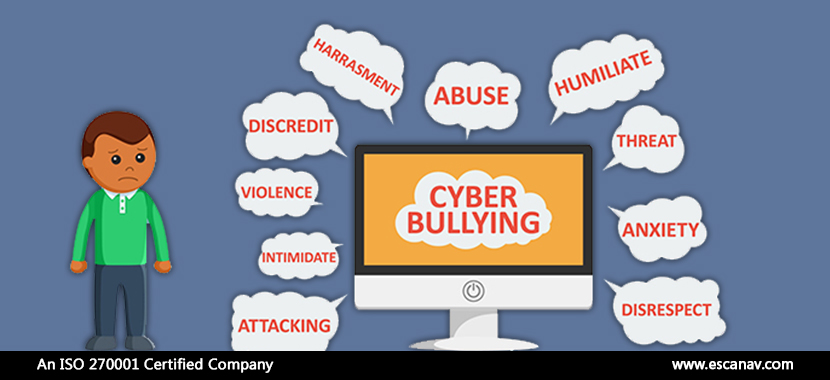Cyberbullying in our country has raised its ugly head once again, affecting the young and the old alike. With peers and guardians failing to wean off their beloveds away from the mobile phones and computers, the cons of the digital universe have slowly started to engulf the best of us. These cons, that arise from the cyberspace slowly start taking effect and can alter a person’s perspective towards life and at times renders them psychologically ill.
Even though Cyberbullying might seem like something that can never happen with us, various reports have emerged from across the world, proving us wrong.
When it comes to India, the masses have slowly and steadily started taking Cyberbullying and its effects on a serious note. Earlier this month we saw a Bollywood actress launch an Anti-Cyberbullying campaign, while an educational institution has helped build a curriculum on cyber safety that heavily deals with Cyberbullying and would be effective in other schools across the city.
The Government also recognizes Cyberbullying as a heinous crime and has laid laws, protecting people against this act. The case of Vishakha vs the State of Rajasthan was the breakthrough case, which leads to the government in forming such stringent laws, protecting women against sexual harassment. This case registered, Supreme Court’s initial brush with Cyberbullying.
So what is Cyberbullying?
Even though there is no official definition for Cyberbullying, we see it as an act which is aggressive in nature and is committed repeatedly by an individual or a group, using electronic mediums of contact, against an individual who is unable to defend himself/herself, easily against the act.
Different kinds of Cyberbullying includes spreading negative content through SMSs or Text, causing humiliation through malicious and hateful comments across online platforms, sharing nasty or false information about a certain individual or organization and more.
Facts of Cyberbullying
As we try to understand and find a solution to ameliorate the threat of Cyberbullying before trying to eradicate it completely, let’s try to study some facts about it.
- A study conducted by Microsoft in 2012, ranks India at the 3rd place, for the most number of online bullying cases recorded, among 25 other countries.
- 70% of Cyberbullying happens on one or two social media platforms only.
- More than 80% of the youth escape scot-free after bullying someone online, while +80% of Cyberbullying happens through handheld devices.
- 90% of the teens have agreed to have ignored Cyberbullying advances from someone online at least once, while a few have stood up against such individuals.
- Victims of Cyberbullying are prone to committing suicide.
Cyberbullying laws in India
There are no specific laws that deal with the cyberbullying. However, there are provisions such as section 67 of the Information Technology act that does cross paths with cyberbullying in a way. In this section, punishment for publishing or transmitting obscene materials in an electronic form is discussed. This punishment may extend to 5 years of imprisonment with or without a fine that can go up to 10 lakh rupees.
Besides section 67, below mentioned are the provisions that deal with cyberbullying laws in India.
- Section 507 IPC – the section states that if anyone receives criminal intimidation by way of an anonymous communication then the person giving threats shall be punished with imprisonment up to two years. By virtue of word anonymous the offense of anti-bullying and cyberbullying is included in this section.
- Section 66 E of IT Act – the section prescribes punishment for violation of privacy. The section states that any person who intentionally violates the privacy by transmitting, capturing or publishing private pictures of others shall be punished with up to three years imprisonment or fine up to three lakhs.
Cyberbullying laws in Educational Institutions
Even though there is a dire need for such laws in schools, there are no laws that deal with cyberbullying in schools. However, the HRD ministry has launched an anti-bullying committee that takes a close look at cyberbullying as well.
At the same time, Universal Grants Commission (UGC) has appointed anti-ragging committees in the UGC recognized colleges. Failing to comply with the rules of this committee, a college can lose its recognition with the UGC.
In Addition to the above, a college student who is found to be the offender of a cyberbullying incident can be made criminally liable under the provisions of code of criminal procedure, 1973.
How to Stop Cyberbullying?
In-order to eradicate Cyberbullying, one has to take certain steps to safeguard their online existence from Cyberbullies.
Following are some of the steps that can be taken to stop Cyberbullying.
- Do not respond – Sometimes all a perpetrator looks for is a reaction. One can stop the advances of an ongoing Cyberbullying incident by choosing not to respond or retaliate, taking away the power from the perpetrator of inflicting any damage.
- Saving the evidence – During or post Cyberbullying incident, one must make sure to save any proof they have of being the victim in such an incident. This could mean saving any posts, comments or texts, even if it’s saved in a screenshot format.
- Ask for help – If the Cyberbully does not relent and keeps going on with his/her behavior, and then the most-sane advice would be to reach out to the concerned authorities (Cyber Crime Division). They would not only hear the complaint but would surely assist a person with their problem.
- Out of Sight, Out of Mind – This is the most common approach used by people on social media. When you are being attacked by a bully, the simplest way to take away the power of humiliation from them is by blocking and reporting that persons account.
- Keeping the access to your social media safe – The easiest measure one could take is to not share their digital passwords with anyone and keep their phone safe to ensure the access to their digital life is not physically compromised.
- Keeping your social profile and Interactions safe –
- Be careful about what you are posting online.
- Do not hurt anyone’s sentiments or post offensive content.
- Have complete control over your profile and ensure who sees the content that you post
- Do not open emails from unverified sources
- Do not download any free media or free software that is not legally approved and hence not regulated.
Being a part of the cybersecurity community, we cannot ensure the complete eradication of Cyberbullying. However, we do make sure that the digital safety and security of you and your family is aided by the various products in our arsenal.
To read more, please check eScan Blog







